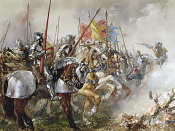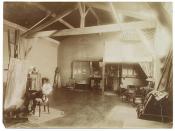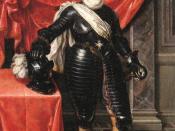Shakespeare's play is about King Henry V based on the historical events during 1398 to 1420. It is a follow-up of Henry IV parts one and two. Shakespeare writes about Harry, Prince Hal before he had become king, and his wild drunken youth. Henry then develops to become a hero, a great ruler and leader.
On the nature of Henry's character, as portrayed by Shakespeare, he is said to have changed in many ways. In act1 scene1, we see one of these changes. Previously, the King was a wild drunken youth and was not at all a religious person. Since he has been crowned king, he becomes a true lover of the church. Canterbury says,
"The courses of his youth promis'd it not." Meaning he was undisciplined before, "The King is full of grace, and fair regard." He now cares for and respects the church.
The King has changed a lot, as a private man back then; he was nothing more than a failure.
Now as a public king, he shows the importance of God, meaning he believes in the divine rights of Kings. He is now a truly religious man; Henry considers the ideas of Canterbury to see if God is in favour, towards his plans.
In act1 scene2 King Henry and all of his noblemen are in a meeting deciding whether to capture the French throne or not, the King asks for the archbishop of Canterbury's explanation as to why England should invade France. Henry is asking if God wants this to happen and says,
"We pray you to proceed, and justly and religiously unfold..."
Canterbury gives all the attendants convincing evidence and urges the King to proceed with the attack.
"Then here me, gracious sovereign, and you peers...Then doth it well appear the Salic law was not...


